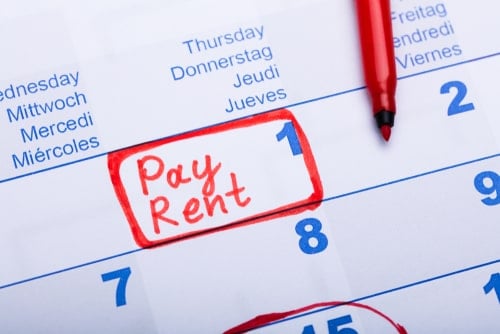
Many landlords who may have otherwise pursued a tenant eviction have so far not been able to due to COVID-19. However, is there an end in sight? At least for now, the federal government has extended the eviction moratorium for residential properties. Understanding changing regulations and executive orders are tough for landlords. After all, there are federal guidelines as well as additional restrictions at the state level. So, continue reading below as we review the current eviction moratorium guidelines and extended state restrictions every landlord should know.
What is an Eviction Moratorium?
The eviction moratorium that sprung from the COVID-19 pandemic protects tenants against all of the following actions. If landlords violate any of these rules, they may face a criminal or financial penalty.
- Landlords may not take any action to evict tenants for unpaid rent, including asking the court for a ‘writ of eviction.’
- The moratorium prohibits landlords from giving tenants an eviction notice.
- Property owners may not harass or intimidate tenants into forcing them to vacate.
What is Not Covered Under an Eviction Moratorium?
- Landlords still may file an eviction for non-rent lease violations.
- An eviction moratorium does not forgive rent, and tenants still owe rent per the lease provisions.
What are the Current Eviction Moratorium Guidelines?
On September 1, 2020, the CDC issued an Order called “Temporary Halt in Residential Evictions to Prevent the Further Spread of COVID-19”. This Order went into effect on September 4, 2020, but was then extended on December 27, 2021.
Through recent developments, the CDC extended the eviction moratorium guidelines until at least March 31, 2021. Furthermore, the documents call for the Federal Housing Finance Authority, the Federal Housing Authority, and the Department of Housing and Urban Development to extend their existing eviction moratorium guidelines. The Order prohibits landlords across the nation from evicting qualifying tenants through the end of the eviction moratorium.
 Who Qualifies for Protection Under the Eviction Moratorium Guidelines?
Who Qualifies for Protection Under the Eviction Moratorium Guidelines?
- Tenants that use their best efforts to obtain emergency or government housing assistance.
- Individuals making their best effort to make partial payments on time.
- Residents who cannot pay the full rental rate due to job loss or other pandemic-related loss of income.
- Any persons who would become homeless or forced to move into shared housing if evicted.
Additional Tenant Requirements Under the Eviction Moratorium Guidelines
Tenants may qualify if any of the following circumstances apply:
- Tenants earn less than $99,000 as an individual or $198,000 if filing 2020 taxes jointly.
- They were not required to report any income to the IRS in 2019.
- Tenants have received an Economic Impact Payment under the CARES Act.
Any tenant seeking protection under the eviction moratorium guidelines must complete a declaration under penalty of perjury that they meet the criteria listed in the Order. That said, attempts to falsify eligibility could result in fines or litigation against the individual.
State-Level Changes to Eviction Moratorium Guidelines
What is tricky for landlords is that there are eviction moratorium guidelines at both the federal and state level. Therefore, navigating if owners can file for eviction and when can prove difficult. The truth is states can enact additional tenant protection measures above and beyond the federal order.

Therefore, tenants who do not qualify for protection under the federal eviction moratorium guidelines may still be protected under state or local orders. Check out these current extended restrictions at the state level below.
- California – Hold on Evictions Through 6/30/2021
- Connecticut – Hold on Evictions Until 4/19/2021
- District of Columbia – Hold on Evictions Until After Emergency
- Hawaii – Hold on Evictions Until 4/13/2021
- Montana – Limited Hold on Evictions Until End of Emergency
- New Jersey – Hold on Evictions Until End of Emergency +2 Months
- New York – Hold on Evictions Until 5/1/2021
- Oregon – Hold on Evictions Until 6/30/2021
- Vermont – Hold on Evictions Until End of Emergency Plus 30 Days
Keep in mind that state regulations and moratoriums have changed several times over the course of the pandemic. Always refer to your jurisdiction’s website for the most accurate and current information. Regardless of whether your state is listed above, the federal order protects tenants from nonpayment of rent eviction until at least March 31, 2021.
How Can Landlords Handle Changing Eviction Regulations?
For landlords struggling to stay afloat during the pandemic, extended eviction protection does little to provide relief. The most vital thing a property owner can do is research the local laws and seek help. After carefully considering your own financial situation, consider some of the following –
 Negotiate with Tenants
Negotiate with Tenants
Communication is critical for property owners. When landlords have a healthy landlord-tenant relationship, negotiating during these hard times may be the key to success for everyone. Try to open communication lines and see what your tenants think is doable for them as they deal with financial hardship. Whatever agreement owners and tenants arrange, ensure it is in writing to avoid any miscommunication. So, with that in mind, consider the following possible arrangements –
- Postpone the Rent – If landlords can postpone rent for a short time, it may assist tenants as they catch up on bills, seek financial aid, or find new employment. Then, create a repayment arrangement that spreads the back due rent out over time.
- Reduce the Rent – If an owner’s financial situation allows, offering reduced rent for a short time may help tenants to fulfill their obligations better. For example, if the rent is $1000, but the landlord can cover $300 of that and still satisfy the mortgage, this could prevent tenants from falling further behind. Remember, when the mortgage is due, receiving some money from tenants, even if not the full amount, is better than nothing.
 Reach Out to Your Mortgage Lender
Reach Out to Your Mortgage Lender
Many private lenders have their own programs to assist homeowners who are behind on or unable to pay their mortgage payments. Furthermore, if Fannie Mae or Freddie Mac owns the mortgage, owners may be allowed to delay making payments for a period of time without incurring added fees or a credit score penalty. So, check with your lender to see what options are currently available.
Look for Government Assistance
Landlords may find assistance under the Coronavirus Aid, Relief, or Economic Security Act. Meanwhile, the Biden administration continues to issue new orders to protect both landlords and struggling homeowners. The current actions and foreclosure moratorium below cover all owners with federally guaranteed mortgages.
- Foreclosure moratorium extended through June 30, 2021
- Mortgage payment forbearance enrollment window extended until June 30, 2021
- Up to six months of additional mortgage payment forbearance, in three-month increments, for borrowers who entered forbearance on or before June 30, 2020.
Hire Professional Management
Following the law is imperative for landlords. However, the constant regulation changes are difficult to keep up with. One surefire way to handle evolving eviction laws is to rely on a qualified property management company’s expertise. Luckily, the experts at Bay Property Management Group provide reliable and efficient property management services in Manassas, Northern Virginia, Washington DC, Central Maryland, and Southern Pennsylvania.
Our team stays abreast of all legal requirements landlords face, whether regarding evictions or general licensing and compliance needs. So, if you are struggling with tenant communication, are unsure of the law in your area, or need help managing leading and maintenance, give us a call today!

 Who Qualifies for Protection Under the Eviction Moratorium Guidelines?
Who Qualifies for Protection Under the Eviction Moratorium Guidelines? Negotiate with Tenants
Negotiate with Tenants Reach Out to Your Mortgage Lender
Reach Out to Your Mortgage Lender